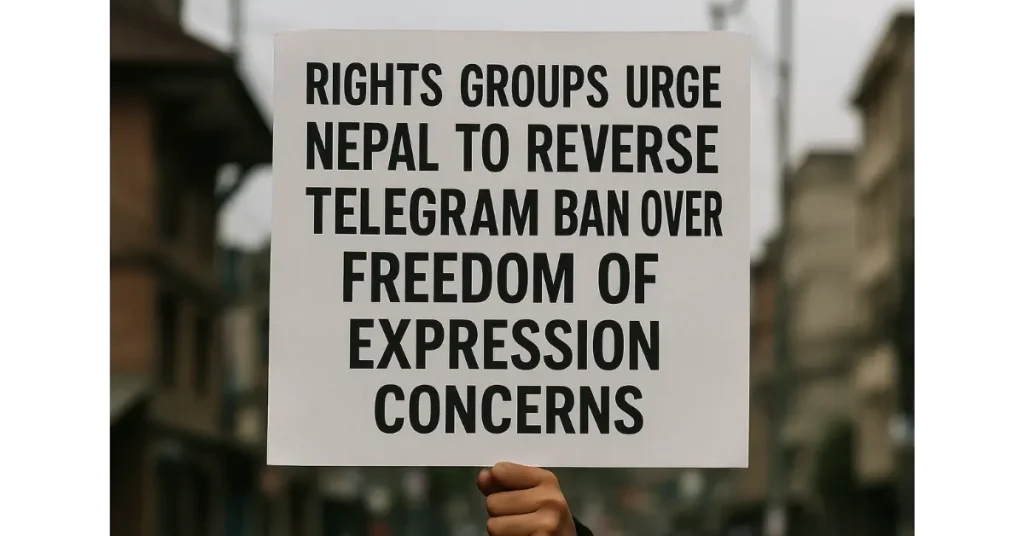In July 2025, Nepal took the drastic step of banning the Telegram app nationwide, citing increasing online fraud, money laundering, and criminal activities carried out via the popular messaging platform. While the government, through the Nepal Telecommunications Authority (NTA), justified the ban as essential for combating cybercrime, the move has ignited an intense debate with digital rights advocates and civil society groups about Nepal Telegram ban’s implications for internet freedom, privacy, and fundamental human rights.
This article explores what led to the ban, its effects on Nepal’s digital landscape, the responses from rights organizations including the Freedom Forum Nepal and the global KeepItOn coalition, and why many urge Nepal’s authorities to reconsider or reverse the ban to uphold free expression and privacy rights within the country.
Understanding the Telegram Ban in Nepal
What Is Telegram?
Telegram Messenger, created by Pavel Durov, is a cloud-based messaging app known for its speed, expansive group chats, and emphasis on user privacy. It offers features like:
- End-to-end encryption in Secret Chats
- Self-destructing messages
- Advanced data privacy controls
- Anonymized message forwarding
- Encrypted data storage on its servers
These features have made Telegram extremely popular globally, especially for communities seeking secure communication, but also difficult to regulate.
The Government’s Case for the Ban
On July 18, 2025, the Nepal Telecommunications Authority ordered all telecom providers to block access to Telegram. Authorities blamed the platform for a steep rise in:
- Online fraud schemes, including fake job offers and cryptocurrency scams
- Money laundering activities
- Coordination of illegal activities, as reported by Nepal Police’s Central Investigation Bureau
The decision came after months of warnings and investigations linking Telegram channels to criminal enterprises, most notably after hacking incidents involving financial apps like F1 Soft. Additionally, the government criticized Telegram for a lack of cooperation in regulating content or providing a local liaison for law enforcement.
Digital Rights and Freedom of Expression Concerns
Response from Rights Groups
The ban quickly drew criticism from multiple rights organizations, including:
- Freedom Forum Nepal
- The KeepItOn coalition (a global network promoting internet freedom)
- National and international human rights organizations such as Amnesty International Nepal
These groups condemned the ban as an overbroad measure that restricts more than just criminal communication, saying it seriously threatens Nepal internet freedom and citizens’ right to online privacy.
Freedom Forum’s Executive Chief Taranath Dahal stated:
“Blocking Telegram is not a permanent solution. The primary responsibility for crimes on the platform lies with the criminals, not Telegram itself. Banning the app threatens fundamental rights to freedom of expression, access to information, and privacy.”
Impact on Everyday Users
Telegram serves millions in Nepal for legitimate purposes including education, healthcare communication, business, social activism, and personal connections. Its blockade risks:
- Severely limiting access to important information
- Disrupting economic activities reliant on digital communication
- Constraining civic participation and expression, especially among youth and activists
- Amplifying misinformation due to lack of reliable communication channels
The ban also undermines global standards around Nepal online privacy rights and hints at escalating Nepal internet censorship trends.
Legal and Policy Context Surrounding the Ban
Nepal’s Internet and Digital Governance
Nepal’s 2015 Constitution enshrines freedom of expression and communication. However, in recent years, measures like the proposed Social Media Regulation Bill threaten to introduce sweeping controls over digital platforms. Critics warn these laws could encourage self-censorship and impose excessive government surveillance.
The Supreme Court of Nepal ruled in 2024 that regulation of social media should be conducted via legislation rather than arbitrary shutdowns, yet the government imposed this ban ahead of any draft laws.
Regulatory Justifications and Challenges
The ban is part of a broader Nepal online fraud crackdown. Authorities frame it as a security imperative, arguing that Telegram facilitates untraceable criminal networks. Yet, experts highlight that:
- Blocking access may push criminals to less visible corners of the internet
- The ban is disproportionate compared to targeted investigations or regulatory dialogue
- Telegram’s privacy features, while challenging to regulate, protect lawful users’ rights
Telegram’s Privacy Features and Global Challenges
Telegram founders and privacy advocates underscore the importance of protection against state surveillance and data exploitation. Key features include:
- End-to-end encryption for private chats
- Self-destructing messages ensuring information permanence is limited
- Extensive controls over who can view personal data and user activity
Globally, Telegram has faced bans or restrictions in places like Vietnam and parts of Russia, related to political control and misinformation concerns, illustrating its complex position balancing privacy and accountability.
The Role of Advocacy Networks and Calls for Reversal
The KeepItOn coalition, representing 345+ organizations globally, has urged Nepal to:
- Immediately reverse the ban on Telegram
- Adopt regulatory measures that respect Nepal digital rights
- Ensure stakeholders, including civil society, are involved in policymaking
- Avoid normalization of internet shutdowns and platform censorship
Similarly, Freedom Forum Nepal demands the government explore cooperative solutions addressing misuse without restricting access for millions of users.
Community voice and digital rights defenders emphasize that Nepal Telegram ban jeopardizes democratic norms and may constitute a Telegram ban human rights violation under international law.
Broader Implications for Nepal’s Digital Future
Freedom of Expression at Stake
The blocking of a major messaging platform threatens Nepal’s vision of an open internet essential for:
- Innovation and economic development
- Democratic participation
- Educational progression, especially in remote areas
- Protection of minority voices and access to diverse viewpoints
Privacy, Security, and Governance Balance
Nepal faces the challenge of balancing:
- National security and combating cybercrime
- Protecting citizens’ Nepal online privacy rights
- Maintaining a free-flowing Internet without arbitrary censorship
International best practices advise transparent, proportional, and rights-respecting regulations across these dimensions.
Summary of Key Points
- Nepal banned Telegram on July 18, 2025, due to rising concerns around online fraud and money laundering.
- The ban affects millions of users relying on Telegram for communication, business, activism, and everyday life.
- Rights groups like Freedom Forum Nepal and the KeepItOn coalition denounce the ban for violating freedom of expression and digital rights.
- The government’s move comes amid wider regulatory shifts, including a proposed Social Media Regulation Bill.
- Telegram’s robust privacy features complicate enforcement but protect legitimate user rights.
- Advocates urge Nepal to repeal the ban and implement more balanced, inclusive policies respecting both security and rights.
Conclusion
Nepal’s decision to block Telegram has sparked a critical conversation about the future of Nepal internet freedom and digital rights. While concerns about cybercrime and online fraud are legitimate, the wholesale ban on a vital communications platform risks undermining fundamental freedoms guaranteed by Nepal’s constitution and international human rights commitments.
The voices of Freedom Forum Nepal, the KeepItOn coalition, and global rights defenders highlight that unrestricted and equitable internet access plays a foundational role in modern democracy, economic prosperity, and social wellbeing. Nepal’s path forward requires careful, transparent regulation that confronts abuse without sacrificing the rights of millions who rely on Telegram’s unique features.
Reversing the ban on Telegram would reaffirm Nepal’s commitment to free expression and privacy in the digital age—an essential step for maintaining trust, innovation, and empowerment for all Nepalese citizens.


